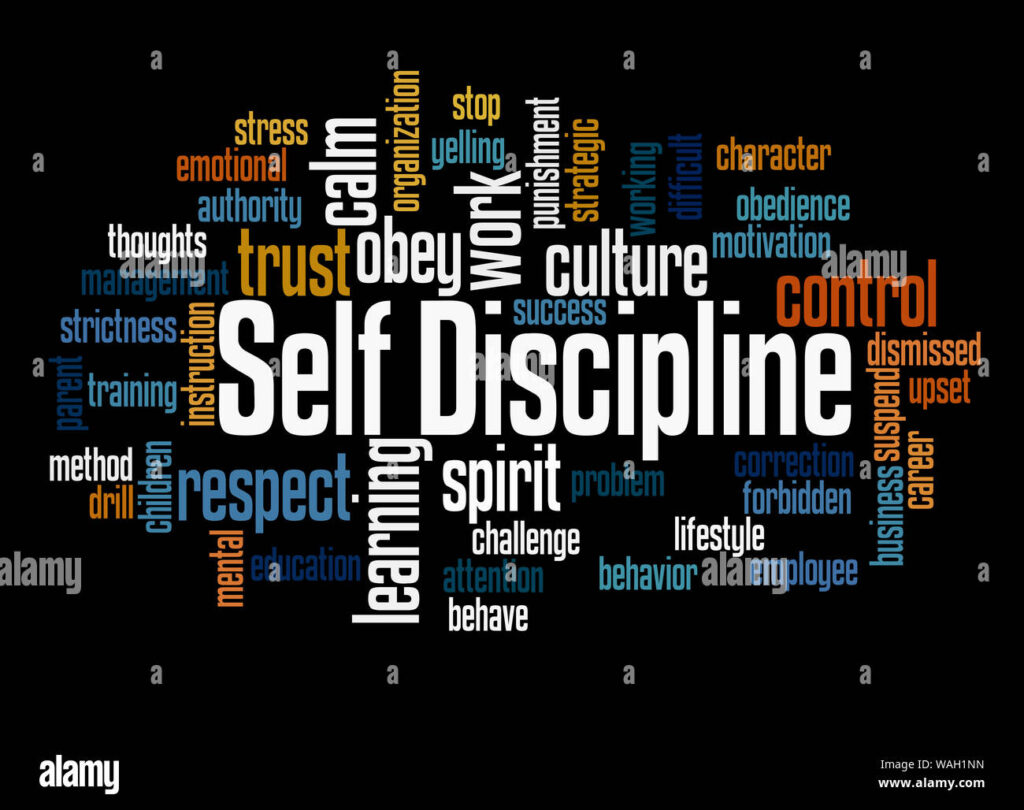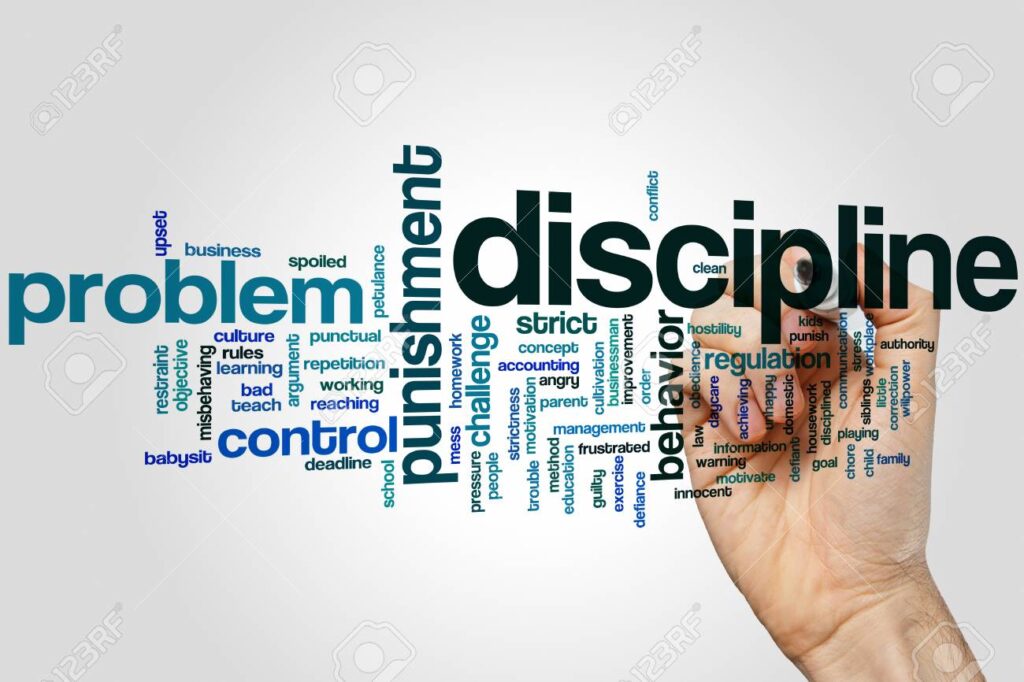The power of discipline, often viewed as a stern taskmaster, holds the key to unlocking immense potential and achieving success in both personal and professional spheres. In this article, we’ll delve into the various dimensions of discipline, its psychological impact, real-life success stories, and practical tips for incorporating it into daily life.

Table of Contents
I. Introduction (The power of discipline)
The power of discipline is an undeniable force that plays a pivotal role in unlocking our full potential. Discipline, defined as the ability to control and direct one’s actions towards a desired outcome, serves as a guiding light in the pursuit of our goals. Whether applied to goal-setting, daily routines, or professional endeavors, discipline is the common thread that weaves success It is the anchor in the face of adversity, providing resilience and steadfastness in times of challenge.
Establishing positive daily routines and habits becomes the foundation upon which the power of discipline is built, fostering consistency and reinforcing its influence in our lives. Procrastination, the nemesis of discipline, is conquered through an unwavering commitment to tackling tasks promptly and efficiently. In the professional realm, discipline sets high standards for performance, creating reliable and consistent individuals dedicated to delivering quality results. Beyond the workplace, the power of discipline extends to personal development and growth, encouraging a continuous pursuit of learning, adaptability, and self-improvement. In essence, embracing discipline in all aspects of life leads to a more fulfilling and purpose-driven existence, making it a transformative force that shapes our character and influences our success.
II. The Psychological Aspects of Discipline (power of discipline)
A. Discipline as a Habit
Discipline as a habit involves the ingrained practice of consistently making choices and taking actions aligned with long-term goals. Treating discipline as a habit means incorporating it into daily routines and behaviors, turning it into a regular and automatic part of one’s lifestyle. Like any habit, discipline requires conscious effort and repetition to become deeply rooted in one’s routine.
Establishing discipline as a habit often starts with the identification of specific goals and the development of a structured plan to achieve them. This plan serves as a guide, outlining the necessary steps and actions required for success. Consistently adhering to this plan, even in the face of challenges or distractions, is where discipline as a habit comes into play.
As a habit, discipline becomes a reliable and predictable force in one’s life. It involves the repetition of positive behaviors and the avoidance of detrimental ones. Over time, these actions become second nature, creating a rhythm that reinforces the pursuit of long-term objectives.
Incorporating discipline as a habit also involves self-monitoring and self-correction. Regular reflection on progress, adjustments to the plan when necessary, and celebrating small victories contribute to the reinforcement of the disciplined habit loop.
Ultimately, viewing discipline as a habit transforms it from a sporadic effort into an integral part of one’s identity and daily life. By cultivating discipline as a habit, individuals can navigate challenges more effectively, maintain focus on their goals, and steadily progress toward personal and professional success.

B. Impact on Mental Health
The impact of discipline on mental health is profound, influencing various facets of cognitive well-being and emotional resilience. Engaging in disciplined practices contributes positively to mental health by fostering a sense of control, purpose, and accomplishment. Here are several ways in which discipline affects mental health:
- Stress Reduction: Discipline helps individuals better manage stress by providing a structured approach to handling challenges. The ability to break down tasks into manageable steps and adhere to a plan can alleviate feelings of overwhelm, promoting a more balanced mental state.
- Improved Focus and Concentration: The Power of Discipline enhances cognitive functions such as focus and concentration. By cultivating the habit of staying committed to tasks, individuals are better equipped to maintain attention, resulting in increased productivity and a more positive mental state.
- Sense of Achievement: Consistent discipline leads to the accomplishment of goals, no matter how small. This continuous cycle of setting, working towards, and achieving goals fosters a sense of competence and accomplishment, positively impacting self-esteem and overall mental well-being.
- Establishment of Healthy Routines: Discipline often involves the creation of positive daily routines, including regular exercise, sufficient sleep, and healthy eating habits. These routines contribute to improved physical health, which, in turn, positively influences mental health.
- Enhanced Resilience: Discipline encourages individuals to persist in the face of setbacks and challenges. This resilience is crucial for maintaining good mental health, as it helps individuals bounce back from adversity, adapt to change, and stay focused on long-term objectives.
- Reduction of Procrastination and Anxiety: Discipline serves as an antidote to procrastination, a habit often linked to anxiety. By addressing tasks promptly and systematically, individuals can reduce anxiety associated with looming deadlines and uncompleted responsibilities.
- Development of a Growth Mindset: Discipline promotes a growth mindset by instilling the belief that continuous effort leads to improvement. This mindset positively impacts mental health by encouraging individuals to view challenges as opportunities for learning and growth.
C. Establishing a Disciplined Mindset
Establishing a disciplined mindset is a transformative process that involves shaping one’s thinking patterns and approach to life in a way that fosters consistency, focus, and long-term success. Here are key elements in cultivating a disciplined mindset:
- Clarity of Goals:
- Begin by defining clear and achievable goals. A disciplined mindset is anchored in a sense of purpose, and having well-defined objectives provides direction and motivation.
- Create a Plan:
- Develop a structured plan outlining the steps required to achieve your goals. Breaking down larger objectives into smaller, manageable tasks makes the path forward more tangible and manageable.
- Prioritize Tasks:
- Discipline involves prioritizing tasks based on their significance and impact. Identify high-priority activities that align with your goals and focus on them before addressing less critical ones.
- Time Management:
- Cultivate effective time management skills. Allocate dedicated time for tasks, eliminate unnecessary distractions, and adhere to deadlines. A disciplined mindset recognizes the value of time and utilizes it wisely.
- Consistent Habits:
- Establish positive daily habits that align with your goals. Consistency in these habits reinforces the disciplined mindset, as they become ingrained routines that contribute to ongoing progress.
- Self-Control and Delayed Gratification:
- Practice self-control by resisting the temptation of immediate gratification in favor of long-term benefits. The disciplined mindset understands the value of delayed rewards and is willing to invest effort patiently.
- Learn from Setbacks:
- Embrace setbacks as learning opportunities rather than failures. A disciplined mindset views challenges as a natural part of the journey, allowing for adaptability and continuous improvement.
- Positive Self-Talk:
- Cultivate a positive inner dialogue. The disciplined mindset avoids self-limiting beliefs and negative self-talk, fostering a constructive and optimistic outlook that fuels perseverance.
- Accountability:
- Take responsibility for your actions and decisions. A disciplined mindset acknowledges accountability, leading to a proactive approach in resolving challenges and staying on course.
- Celebrate Progress:
- Acknowledge and celebrate small victories along the way. Recognizing progress reinforces the disciplined mindset by providing positive reinforcement and motivation to continue the journey.
- Continuous Learning:
- Foster a mindset of continuous learning and improvement. Embrace challenges as opportunities for growth, seeking knowledge and skills that enhance your capabilities over time.
By consciously integrating these elements into daily life, individuals can gradually establish and reinforce a disciplined mindset. This mindset becomes a guiding force, shaping behavior, fostering resilience, and paving the way for sustained personal and professional success.
III. Benefits of Discipline (power of discipline)
A. Achieving Goals
Discipline is the driving force behind goal attainment. Whether personal or professional, a disciplined approach ensures a steady progression toward desired outcomes.
B. Time Management
Effective time management is a critical skill that empowers individuals to optimize their productivity and reduce stress. This skill involves prioritizing tasks based on urgency and importance, setting clear goals, and creating well-structured schedules. Utilizing strategies such as time blocking, breaking down tasks into smaller steps, and eliminating time-wasting activities contribute to a more efficient use of time.
Setting realistic deadlines and employing time management tools, such as calendars and task management apps, aids in organization and tracking progress. Flexibility and adaptability are crucial, allowing for adjustments when unforeseen events occur. Regular breaks enhance focus and prevent burnout, while learning to say no ensures that time is allocated to priorities. Ultimately, mastering time management is an ongoing process that enhances one’s ability to achieve goals and maintain a healthy work-life balance.
C. Improved Decision-Making
Disciplined individuals are known for making well-thought-out decisions. We’ll explore the connection between discipline and enhanced decision-making skills.
IV. The Role of Discipline in Success Stories
A. Case Studies of Successful Individuals
Examining the lives of successful individuals reveals a common thread – discipline. This section dissects success stories, highlighting the pivotal role discipline played in their journeys.
B. How Discipline Played a Pivotal Role in Their Journeys
Understanding the specific instances where power of discipline made a difference offers valuable insights into its transformative power.
V. Discipline in Daily Life
A. Creating a Disciplined Routine
Crafting a disciplined routine forms the foundation for success. Practical tips on structuring daily life for optimal outcomes will be explored.
B. Balancing Work and Personal Life
Maintaining discipline in both work and personal life is a delicate balance. Learn strategies to navigate this equilibrium successfully.
C. Small Habits for a Disciplined Lifestyle
Incorporating small, manageable habits contributes significantly to overall discipline. Discover simple practices that pave the way for a disciplined lifestyle.
VI. Overcoming Challenges to Discipline
A. Identifying Common Obstacles
Recognizing common challenges to discipline is the first step in overcoming them. This section sheds light on obstacles and provides insights into addressing them.
B. Strategies to Overcome Challenges
Practical strategies to tackle challenges head-on will empower readers to maintain discipline, even in the face of adversity.
VII. Teaching Discipline to Children
A. Importance of Instilling Discipline Early
Early exposure to discipline lays a strong foundation for a child’s future. We’ll discuss the significance of instilling discipline from a young age.
B. Practical Tips for Parents
Parents play a crucial role in teaching discipline. This section offers actionable tips for parents to foster discipline in their children.
VIII. Discipline in the Workplace
A. Impact on Professional Growth
Discipline is a catalyst for professional success. Explore how a disciplined approach at the workplace contributes to career growth.
B. Strategies for Maintaining Discipline in a Work Environment
Navigating the challenges of a professional setting requires discipline. This part provides practical strategies for maintaining discipline in the workplace.
IX. Discipline and Stress Management
A. How Discipline Contributes to Stress Reduction
Discipline is a powerful stress management tool. Understand the correlation between disciplined living and reduced stress levels.
B. Incorporating Discipline in Coping Mechanisms
Explore ways to incorporate discipline into coping mechanisms, enhancing mental resilience during challenging times.
X. The Connection Between Discipline and Personal Growth
A. Continuous Learning and Self-Discipline
The journey of personal growth intertwines with continuous learning and self-discipline. Uncover how discipline propels individuals toward continuous improvement.

B. Evolving Through Disciplined Habits
Adapting and evolving are key aspects of personal growth. Discover how disciplined habits contribute to this ongoing process.
XI. Discipline vs. Rigidity
A. Understanding the Balance
While discipline is essential, striking a balance is equally crucial. Delve into the distinction between discipline and rigidity.
B. Flexibility Within Disciplined Frameworks
Learn how to be flexible while maintaining discipline, ensuring adaptability without compromising on core principles.
XII. Famous Quotes on Discipline
A. Insights from Renowned Personalities
Renowned personalities share their thoughts on discipline. Gain motivation from insightful quotes that reinforce the power of discipline.
B. Motivational Quotes to Reinforce Discipline
Inspirational quotes serve as reminders of the strength and impact of discipline on the path to success.
XIII. The Future of Discipline
A. Technological Advancements and Discipline
In a rapidly evolving world, technology influences various aspects of our lives. Explore how technological advancements intersect with the future of discipline.
B. Adapting Discipline in a Fast-Paced World
Adapting discipline to the pace of modern life requires innovative approaches. Discover strategies for maintaining discipline in a fast-paced world.
XIV. Practical Tips for Developing Discipline
A. Gradual Approach to Building Discipline
A step-by-step approach to building discipline (power of discipline) ensures long-term success. Learn how to adopt a gradual yet effective strategy.
B. Customizing Strategies Based on Individual Preferences
Recognizing individual preferences is key to sustaining discipline. Discover how to customize discipline-building strategies for personal success.
XV. Conclusion
In conclusion, the power of discipline is transformative, shaping every facet of life. Embracing discipline empowers individuals to overcome challenges, achieve goals, and foster continuous personal growth.
5 Unique FAQs
- Is discipline the same as self-control? Discipline and self-control are related concepts, but discipline encompasses a broader spectrum, including habits and routines that contribute to overall personal development.
- Can discipline be learned later in life? Absolutely. While early exposure is beneficial, discipline can be cultivated at any age through conscious efforts and a commitment to positive change.
- How do I find the right balance between discipline and flexibility? Striking the right balance involves understanding your priorities, setting realistic goals, and being adaptable without compromising core principles.
- Is discipline more important in personal or professional life? Both are crucial. Discipline in personal life influences professional success, and a disciplined approach at work enhances overall well-being.
- What is the power of discipline? The Power of Discipline refers to the profound impact that a structured and consistent approach to behavior and actions can have on individual achievement, success, and personal development. Discipline involves the ability to regulate oneself, make consistent choices aligned with long-term goals, and resist the temptation of short-term gratification. It is a force that empowers individuals to overcome obstacles, stay focused on objectives, and consistently work towards self-improvement.









